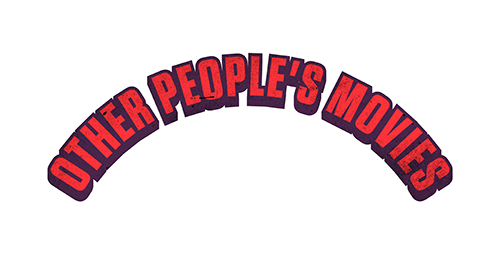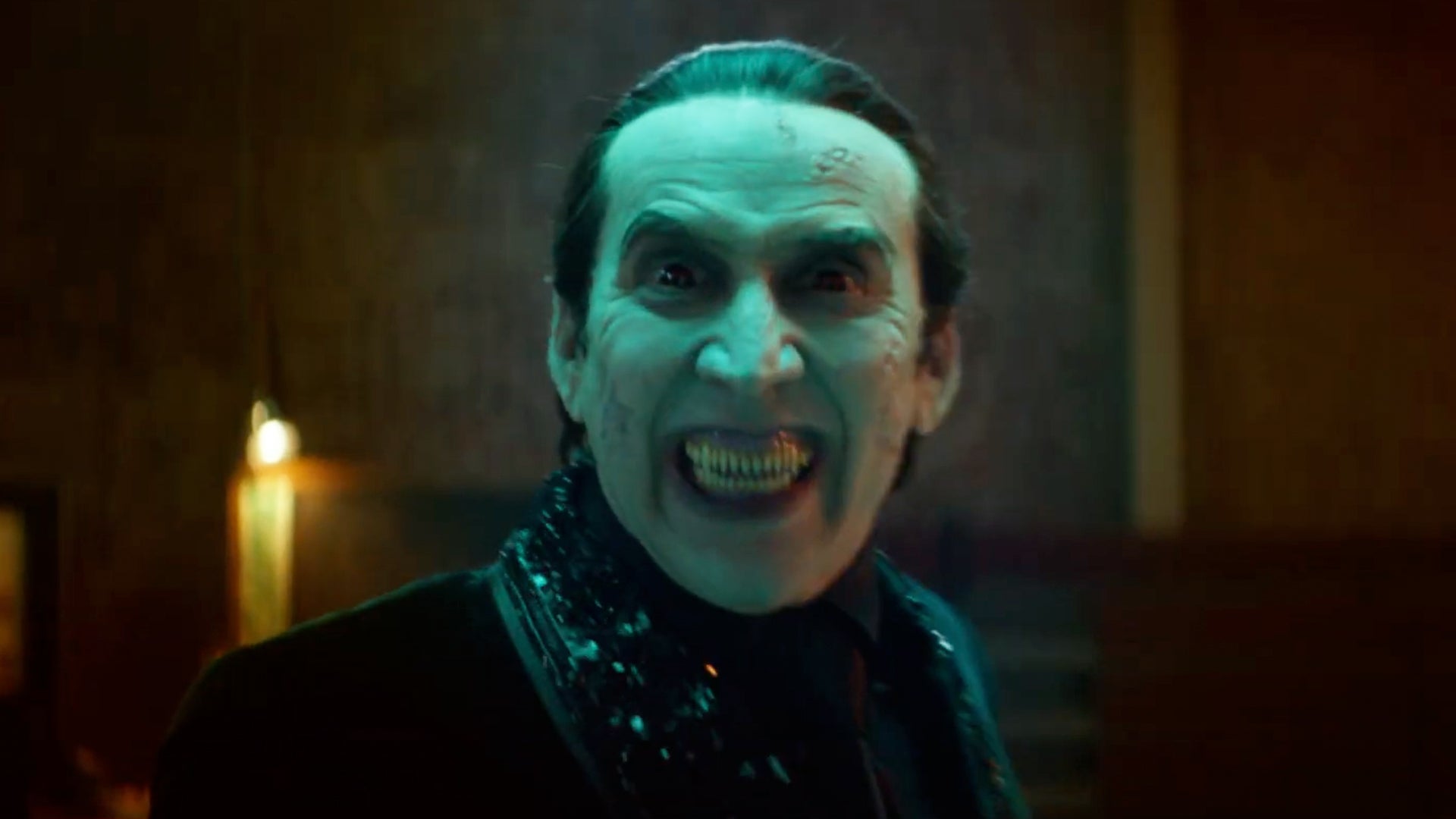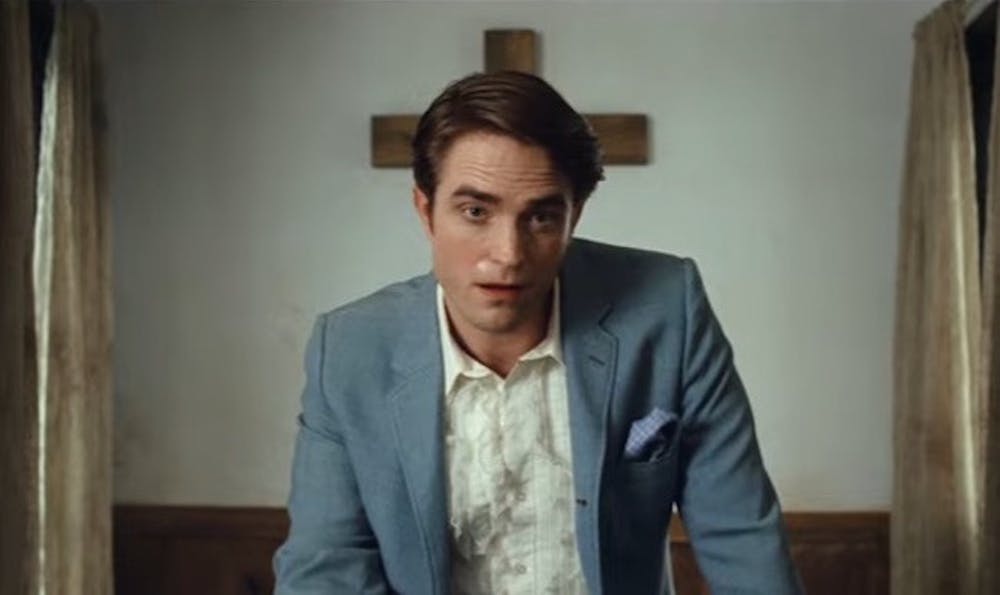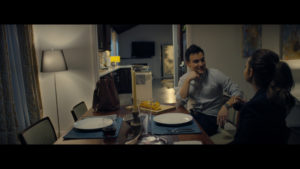
Clocking in at just eleven minutes, Dylan is the kind of short film about which the less is said, the better. The viewer’s enjoyment of the film hinges upon director Cory Miller’s carefully calculated and skillful unraveling of costar Rob Belushi’s cleverly dark and shocking screenplay. Simply put, a lot happens in Dylan’s miniature runtime, and to spoil any piece of what is so wonderfully twisted and surprising about it would be like upsetting an elaborate domino setup midway through its construction.
That being said, the official logline for the film’s press release is about as specific (and as vague) as it should get:
“When Nick asks his long-time girlfriend Maritza to let his old college buddy, Dylan, spend the night after not seeing him for a few years, she acquiesces without anticipating that she will be alone with their unpredictable guest.”
Featuring standout performances from leads Aimee Carrero and Belushi, Dylan has already proven to be a successful calling card for all involved. It has won multiple awards and nominations, having been accepted into more than twenty festivals across the nation (Malibu International, Julien Dubuque International, Chicago Horror, Indiana Comic Com, Newport Beach, LA Shorts International, Michigan Comic Con, and Cinema at the Edge chief amongst them). In October of 2018, it made its debut on Amazon Prime, where it can now be rented or purchased.
In promotion for the film’s release on Amazon, writer/executive producer/costar Rob Belushi and director Cory Miller are here to answer some questions for Other People’s Movies about Dylan’s production, their influences, and what they hope for the future of their film and careers.
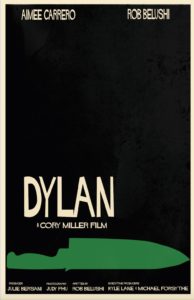
Thanks so much for taking the time to talk with us, guys. Rob, since this is your first official writing credit, why don’t you tell us how it originated and how it evolved into the film it is now?
Belushi: So Dylan really began when Cory told me an owner of a small studio space wanted (cinematographer) Judy (Phu) to bring some content to the space so it could be seen as a viable shooting location for a broader spectrum of production. Cory was like, “Let’s shoot something small this summer.” I was like, “cool.” That night I looked at the space online and wrote Dylan to fit the location. The idea was to have someone enter with some kind of news or information that would present a tonal shift to the people living in what looked like a high priced condo. I had Aimee in mind when writing it, so it was really easy with one character down.
What I wound up with was a little different, but still along the lines of a gradual tonal shift. Cory gave his thoughts and we reworked it a couple times to be a little clearer and less open-ended, but essentially found something we all liked pretty quickly.
The dude with the free studio was difficult and ultimately made the studio a no-go, so I scrambled to re-write it and we shot it at my house. Which is not a ton of fun. Especially when you have very verbal wiener dogs.
Rob, you’ve been acting quite a while. What made you want to write the role of Dylan for yourself?
Belushi: I guess for me I wanted to play something I don’t get cast as very often, someone with a dark side that is revealed. And I fit the profile exactly. Down to the bed-wetting. Plus it was fun to act with Aimee again– we met on a movie years ago and I just think she’s so good. We were lucky to have her.
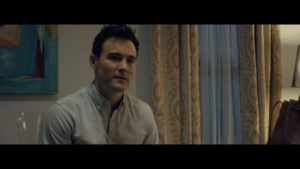
Who are both of your influences— in general and on Dylan?
Belushi: (Cory) and I have always been fans of the genre– we read all of John Douglas’s books on profiling and love Fincher and Silence of the Lambs and all that. I think Judy used Fincher for coloring and tone, and I know Cory wanted to keep the Dylan character shrouded in visual mystery, so he tried to stay wide for a while.
Miller: (My general influences are) Hitchcock, Fincher, Scorsese, Michael Mann, Sam Fuller, Billy Wilder, Shane Black, PTA. For (Dylan), It Follows and Shadow of a Doubt.
Cory, tell us about your background. Did you go to film school? Has directing always been your goal/is it your ultimate goal?
Miller: I’ve taken a bit of a circuitous route to film. I went to Wesleyan with Rob, majored in English and American Studies, which led me to… Nothing, as many liberal arts grads find. So, naturally, I got a job in New York investigating complaints against the NYPD. I worked there for four years, loved it but it wasn’t a career. It did, however, give me tons of stories and a much better understanding of that world. From there I went to UCLA film school, studied directing, made a bunch of shorts, wrote scripts and here I am. Directing is definitely my goal, though I love writing and I’ve spent the last few years doing a ton of it.
What excited you about Dylan, Cory?
Miller: I love thrillers and I was excited to work in that genre. Working with great actors like Rob and Aimee was huge. We had such a tight production schedule and just didn’t have time for a ton of takes. The fact that Rob and Aimee nailed it on the limited takes that we had not only made the movie work, it made my job so much easier. I’m very fortunate to work with such pros.
This was your first time directing a project you didn’t write, Cory. How was it different working on someone else’s material? How was the experience when the writer was also the lead actor/executive producer?
Miller: It was definitely different. I’m used to writing my own work, but this was also liberating. Sometimes when it’s my own material I can’t always get the objectivity that I need. The fact that it was with the lead actor/producer was a balancing act. You want to ensure that Rob is happy with the product, but I was lucky that he was very generous in terms of allowing me the creative freedom to shoot it in the way that I wanted.
We had our share of conflicts, but that was healthy — we’ve known each other a long time and we both know we’re coming from a place of wanting to make the best piece, and any conflict ends up forcing you into a discussion that makes the piece stronger. It was a really good working relationship.
Belushi: Cory and I have very similar taste in movies and stories in general. He is an incredible writer with a lot more experience than me– in fact, he was at the Sundance Writer’s Lab with a feature just before we shot.
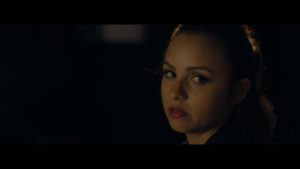
How did your education at UCLA prepare you for this and other directorial projects, Cory?
Miller: (At UCLA), you end up cycling through all the major positions on film sets. And though I don’t want to gaff or sound mix professionally, doing those jobs on multiple sets gave me a much better understanding of production and, I think, makes me a better director. You end up understanding how long a set up may take, when to allow for more time or push to go faster, when to accommodate sound and the fundamental importance of getting good production audio, what lenses to use, how to communicate with heads of department, etc.
Tell us about your Wesleyan experience, Rob. How did you go from studying film production to pursuing acting?
Belushi: I graduated from Wesleyan with an Honors B.A. in Film Studies, and that education was a dream come true for me. I loved the school, and the department so much– studying with Janine Basinger was something I wanted to do in high school. She was incredibly kind to me, and maybe I didn’t really deserve it as I was kind of spinning out of control in college. But she got me through my thesis film with the help of Jacob Bricca and it turned out to their liking. I really enjoyed the process, and I love working with actors.
My goal was originally to do more production work, but at Wesleyan I met a professor, Yuriy Korodonskiy (now at Yale cause he’s a baller), and studied with him for two years. He opened my eyes to the importance and relevance of theater and acting in a way that felt new and very much my own in a place that was far from Los Angeles and any family connection. I decided I wanted to continue to train ‘cause I loved it but sucked, so moved to Chicago and trained in improv (where you and I met!) and did theater for 6 years before moving back to Los Angeles.
What was the final budget on Dylan?
Belushi: I think in the end with travel and festivals and everything the budget was about 12/13k. And I’m pretty happy with what we put on the screen for that much money. I know some could probably do it for cheaper, but when I see shorts that cost 40 or 50k at festivals, I feel really proud that we can play in the same programming. I think I was most proud at ScreamFest– I thought the films were all really good and we fit right in.
What were the biggest hurdles in the production, considering its low budget?
Belushi: I wish we had more time and money of course– it was a quick shoot over two nights often only getting a take or two per shot which probably limited Cory and Judy more than I’d like– but by then we were really struggling to complete it. Post took 3 weeks after first assembly to final sound mix.
Biggest hurdle was fund-raising and scheduling. (Producers) Kyle (Lane) and Michael (Forsythe) handled a lot of the first problem for me, and then flew out during production to be hands on and helped a lot. They also repped us at festivals and did some heavy lifting with promotion. They were pretty integral– without them Dylan would never have happened. We also got some money from some other generous and supportive people I reached out to and we are all very indebted to them.
Miller: It’s always a time and money thing. We went into this with clear eyes knowing the logistical difficulties. Again, having such incredible actors makes everything easier. At the end of the day no one gives a shit how great your steadicam move is if the acting sucks so I always try to service that idea.
Rob and Aimee killed it. The biggest challenge was the big scene– it was about 6 pages, there were a lot of beat shifts that needed to be done delicately without tipping our hats. And then staging and shooting it simply while getting everything we needed. It was a lot. I think just having directed a bunch of other shorts helped me problem solve. Having that experience of knowing what we needed and what we didn’t.
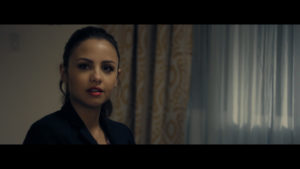
Aimee Carrero is truly fantastic in this. How exactly did you land her for the role?
Belushi: She’s married to my best friend and I hooked them up so she owed me. But she is the easiest person to work with and Cory was so impressed with her. She’s a pro, and she’s everywhere these days. I met her on Devil’s Due and we became friends, and I reached out to her after an arc she did on Americans to tell her she was fucking awesome and then I set her up with my friend Tim and now she has to see me all the time. I love her.
Why did you decide to do Dylan as a short instead of a feature? Is there any hope of it evolving into a feature?
Belushi: We always set out to do a short. Something to show me in a different light, something that Cory could add to his directing reel, showcase Judy. We wanted to start small and see how we did. And I learned a lot. I mean, producing something even small is hard, you gotta keep building the momentum.
Once it was in the can and we were waiting for festivals we kicked around a cool anthology concept based on everyday danger– but at our premiere at Malibu International Film Festival, we were approached by some producers who responded to the short and we have been developing it with them into a feature. Cory and I co-wrote it and we’re pretty excited about what we’ve got with the bigger story. It’s been a lot of work, but it’s been really fun getting to know these characters in a deeper way and building out more of the world– and working with these producers has been an incredible opportunity.
Cory, are you more interested in pursuing television or features? What’s next for you?
Miller: I’d love to do both. It’s just a matter of what’s the best format for the project. I’ve been working on projects in both mediums and just want to keep pushing all of those boulders up hill…
What’s next… I have a couple features I’ve written that I’d love to get off the ground. And a few ideas that have been percolating for a while that I’m excited to write in the coming months, both feature and TV. The dream (is) just to keep working. And if I’m lucky to adapt Faulkner to the screen. Get me some nerd bonafides with that…

What’s your advice to independent filmmakers wanting to make their own short or feature?
Belushi: I would say I’m a bad person to ask about the independent market– I’ve been in some indies, but our experience with Dylan has been pretty lucky. I mean, Cory and I joke that Dylan has been like a film school hope cliché’: Make a short, it wins awards and producers want to turn it into a feature! Never happens. I will say, just make the thing, you can’t possibly know what will happen, either good or bad, but making the thing was so incredibly satisfying on its own, that all the festivals and feature possibilities and awards were extra.
I had a blast working creatively with my friends, even when we were clashing, and the whole process filled me with joy and confidence. We were newbies on the festival scene, and getting into over 20 fests and winning awards was both surprising to us and also exciting, it’s really nice to watch audiences watch what you’ve made. The weird uncomfortable laughs, the gasps. And meeting the filmmakers and festival programmers was pretty special. It’s so cool to see everyone’s work on display, with people who are excited about it. People were extremely supportive of Dylan, other filmmakers, audiences, programmers– it made us feel great and honestly there were so many cool shorts and docs that we saw along side it that we felt really honored to be included.
Thanks again for talking with us, guys! Continued good luck with the movie and on your future projects!
Dylan is currently available on Amazon Prime and is being distributed by Leomark Studios. Its official site can be found here.
